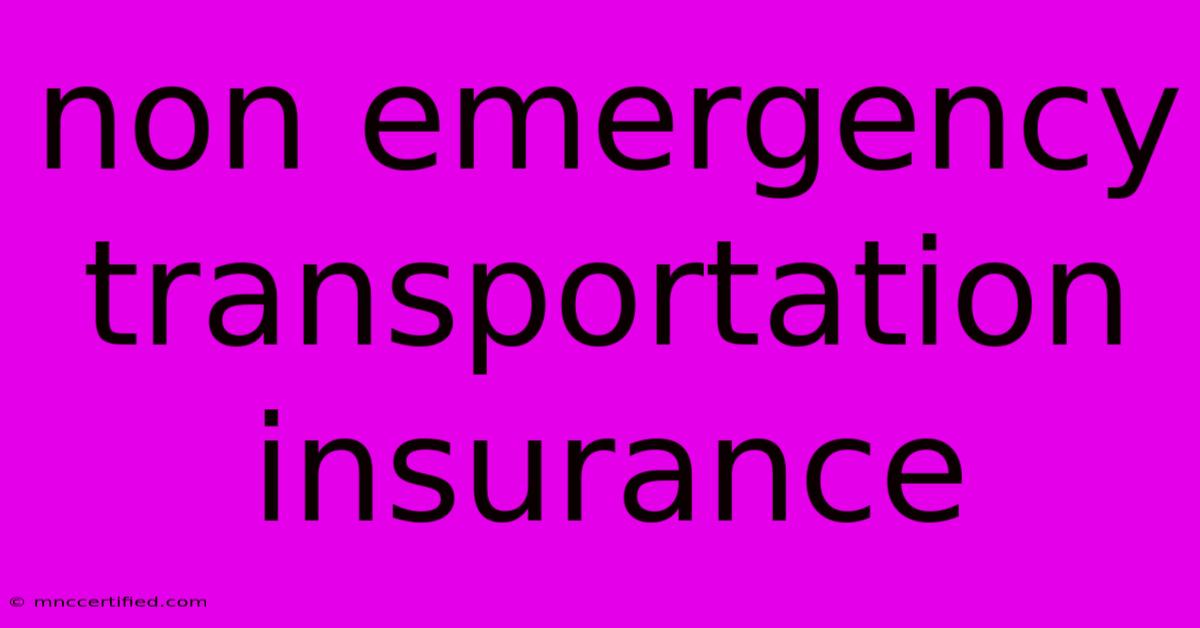Non Emergency Transportation Insurance

Table of Contents
Navigating the World of Non-Emergency Transportation Insurance: A Comprehensive Guide
Non-emergency medical transportation (NEMT) is a crucial service for individuals who require assistance getting to and from healthcare appointments. It can be especially vital for seniors, individuals with disabilities, and those recovering from surgery. But navigating the complexities of NEMT can be challenging, especially when it comes to non-emergency transportation insurance. This guide breaks down everything you need to know about this coverage, empowering you to make informed decisions about your healthcare needs.
What is Non-Emergency Transportation Insurance?
Non-emergency transportation insurance is a type of coverage that helps pay for transportation services related to healthcare appointments, excluding emergencies. It typically covers:
- Doctor's appointments: Routine checkups, specialist visits, and therapy sessions.
- Hospital visits: Pre-scheduled appointments, outpatient procedures, and follow-up care.
- Dialysis appointments: Regular trips for dialysis treatment.
- Other healthcare services: Mental health appointments, physical therapy, and rehabilitation.
Who Needs Non-Emergency Transportation Insurance?
Non-emergency transportation insurance can be particularly beneficial for:
- Seniors: As individuals age, they may face mobility challenges that make it difficult to drive themselves or rely on public transportation.
- Individuals with disabilities: People with disabilities may require specialized transportation services to access healthcare safely and comfortably.
- People recovering from surgery: Post-surgery recovery can often limit mobility, requiring transportation assistance.
- Individuals with limited access to transportation: Those living in rural areas, with limited public transportation options, or those who cannot drive due to medical conditions may find NEMT insurance valuable.
Understanding the Coverage Details
Non-emergency transportation insurance policies can vary significantly. Here are some key factors to consider:
- Coverage limitations: Some policies may have limits on the number of trips covered per year, the distance covered, or the types of transportation services included.
- Deductible: This is the amount you pay out-of-pocket before the insurance starts covering the cost of transportation.
- Co-payment: A fixed amount you pay for each trip.
- Network providers: Some policies may only cover transportation services provided by specific NEMT providers.
- Exclusions: Certain types of trips may be excluded from coverage, such as trips to recreational activities or social events.
Finding the Right Coverage for Your Needs
Here are some tips for finding the best non-emergency transportation insurance:
- Compare plans: Research different NEMT insurance providers to compare coverage details, premiums, and deductibles.
- Check eligibility requirements: Ensure you meet the provider's eligibility criteria, such as age or health conditions.
- Review the policy carefully: Understand the terms and conditions, including any limitations or exclusions.
- Consider your needs: Evaluate your transportation requirements and choose a plan that aligns with your specific needs.
Options for Non-Emergency Transportation Insurance
Here are some common ways to access non-emergency transportation insurance:
- Medicare: Medicare offers limited transportation coverage, typically for medically necessary services.
- Medicaid: Medicaid programs may include coverage for NEMT services.
- Private insurance: Many commercial health insurance plans offer NEMT coverage as an optional benefit.
- Employer-sponsored plans: Some employers may offer NEMT coverage through their group health insurance plans.
- Standalone NEMT insurance: Several specialized companies offer NEMT coverage as a standalone product.
The Bottom Line
Non-emergency transportation insurance is a valuable resource for individuals who require assistance with healthcare transportation. By understanding the different options, coverage details, and eligibility requirements, you can choose the right plan to ensure you have access to the care you need.
This guide provides a starting point for your research. Remember to consult with healthcare professionals and insurance agents to get tailored advice and make informed decisions regarding your specific needs.

Thank you for visiting our website wich cover about Non Emergency Transportation Insurance. We hope the information provided has been useful to you. Feel free to contact us if you have any questions or need further assistance. See you next time and dont miss to bookmark.
Featured Posts
-
Heretic Ending Explained Beck And Bryan
Nov 09, 2024
-
Cardiff City Injury News Manager Talks Future
Nov 09, 2024
-
Federal Investigation At Alfie Oakes Naples Home
Nov 09, 2024
-
Multiple Stores Recall Cheese Due To Listeria Risk
Nov 09, 2024
-
Best Adhesive To Bond Plastic To Metal
Nov 09, 2024